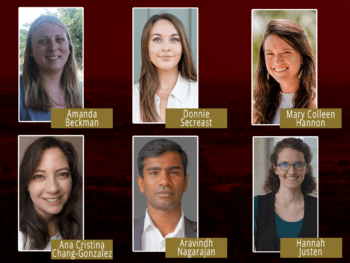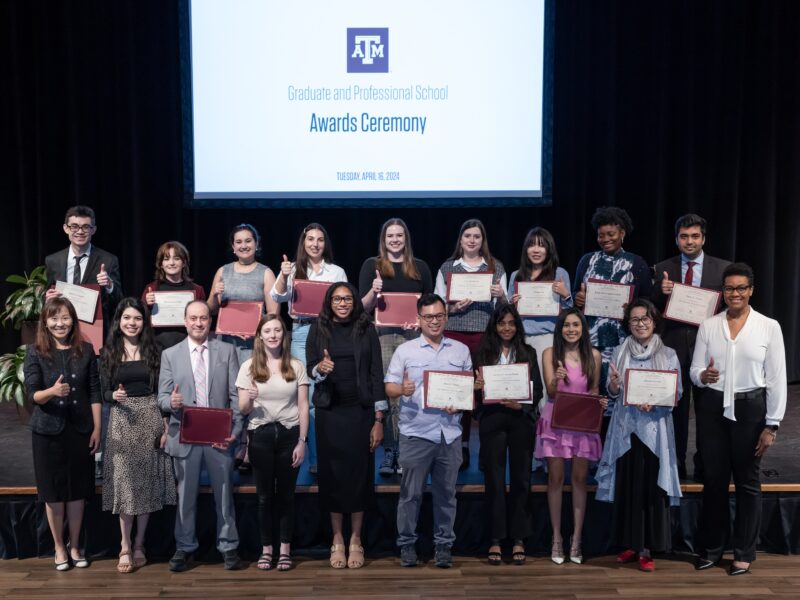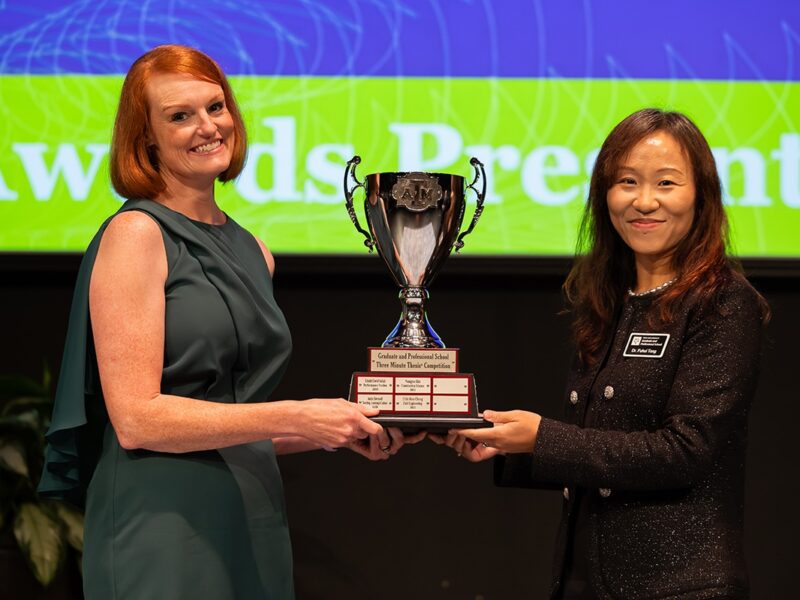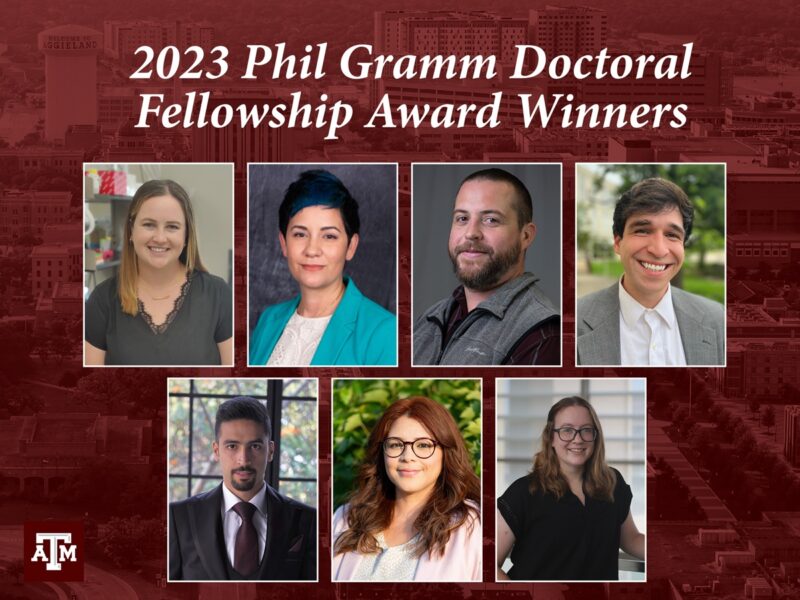Texas A&M Announces The 2022 U.S. Senator Phil Gramm Award Winners

The Texas A&M University Graduate and Professional School has selected its U.S. Senator Phil Gramm Fellowship award winners for 2022. These fellowships are awarded annually to outstanding current doctoral students whose excellence in both research and teaching exemplifies the meaning of scholarship and mentorship in the highest sense.
Made possible by gifts from donors in honor of Senator Gramm, these awards reflect Gramm’s appreciation of the vital role graduate students play in helping Texas A&M University achieve its teaching and research missions, as well as honor his legacy of scholarship, leadership and public service.
Gramm earned a Ph.D. in economics from the University of Georgia and served as an economics professor at Texas A&M for 12 years before turning to politics. Gramm first represented Texas’ 6th congressional district in the U.S. House of Representatives before being elected to the U.S. Senate, where he served for nearly two decades. He is currently the senior partner of Gramm Partners, a public policy firm in Washington, D.C., and is the senior advisor at U.S. Policy Metrics.
The 2022 awardees each receive a personalized certificate and a fellowship in the amount of $5,000 to support their continuing studies. They will be honored at an invite-only ceremony on October 5.
The 2022 U.S. Senator Phil Gramm Doctoral Fellowship Award winners are:
Amanda Beckman is a doctoral candidate in ecology and conservation biology. She holds a bachelor’s degree in biology and a minor in chemistry from Florida State University. Beckman’s research, co-advised by Dr. Sarah Hamer and Dr. Gil Rosenthal, investigates how management efforts and various sources of anthropogenic selection have impacted the evolutionary trajectory of turkeys. Collaborating with hunters and wildlife agencies across North America, Beckman has collected hundreds of turkey feathers to serve as sources of DNA, allowing her to analyze population structure and hybridization between subspecies of wild turkeys at an unprecedented scale. Using these sources of DNA, her dissertation explores the genomic impacts of turkeys’ close association with humans in different contexts and advances our understanding of the modern evolutionary pressures that shape the populations of all species. Beckman has been recognized for her research and service through the Ecology and Evolutionary Program Student Award, the Schubot Center for Avian Health Director’s Award, and the Bryan/College Station Girl Scout Service Unit Star Volunteer Award.
Ana Cristina Chang-Gonzalez is a doctoral candidate in biomedical engineering with a focus on molecular biomechanics. Under the advisement of Dr. Wonmuk Hwang, Chang-Gonzalez has worked to develop methods to construct quantitative surface models of human and zebrafish embryo brains from three-dimensional image stacks. Her research currently focuses on uncovering the mechanics of the T-Cell Receptor, a key component of the adaptive immune system, via molecular dynamics simulations. Chang-Gonzalez is an awardee of the National Science Foundation Graduate Research Fellowship for 2016, and has received awards from the Korea Institute for Advanced Study, the Biophysical Society, and the Protein Society. She was recently featured in the cover article of the journal Biophysical Reports for her paper on three-dimensional image stacks. Chang-Gonzalez enjoys developing materials to teach scientific concepts, such as contributing to the Biomedical Engineering Graduate Student Association’s children’s book project “ABC’s of Biomedical Engineering” and leading an AggiE-Challenge team.
Mary Colleen “MC” Hannon is a doctoral candidate in marine biology at the Texas A&M University at Galveston campus. Under her advisor, Dr. Anja Schulze, Hannon researches the reproductive cycle of a local marine worm, expanding the current understanding of the genetic drivers and associated muscular transformations behind this worm’s sexual metamorphosis. Hannon’s research has garnered funding from the American Microscopical Society, Texas SeaGrant, and the Smithsonian National Museum of Natural History. As a member of the Invertebrate Zoology teaching team, Hannon helped developed a unique curriculum for remote teaching in 2020. Hannon has served on multiple administrative committees and executive boards at both the university and departmental levels and, for organizing a workshop for her fellow graduate students on resources and training for mentoring undergraduates, has completed the requirements for the advanced-level professional development certificate offered by the Graduate and Professional School’s G.R.A.D. Aggies program.
Hannah Justen is a doctoral candidate in ecology and evolutionary biology. After completing her bachelor’s in Environmental Impact Assessment and her master’s in Molecular Biology and Evolution in Germany, she joined Texas A&M in 2018, where she works under the advisement of Dr. Kira Delmore. Her research has the potential to fill important gaps in our understanding of the process of speciation, or the creation of new species that occurs when groups within a species develop new and unique characteristics. Her dissertation specifically tracks songbirds in the wild, investigating which genes control their seasonal migration patterns and how that contributes to speciation. Justen’s work has been supported by several grants and fellowships, including funding from the American Philosophical Society, Animal Behavior Society, the Schubot Center, and an International Fellowship by the American Association of University Women. Passionate about education and outreach, Justen has been involved in classroom teaching and mentoring undergraduate students during field collection trips and is part of a group dedicated to make research on seasonal migration more accessible to students and the public.
Aravindh Nagarajan is a doctoral candidate in the interdisciplinary graduate program in genetics and genomics. Having graduated with a bachelor’s degree in biotechnology from Anna University in Chennai, India, and a master’s degree in biotechnology from Texas A&M, Nagarajan joined the lab of Dr. Helene Andrews-Polymenis to study the host-pathogen interaction. His current research, using laboratory mice and multidrug resistant Staphylococcus aureus, seeks to understand the genetic factors behind why some people infected with the same pathogen get sick while others stay asymptomatic. Nagarajan is co-author of several peer-reviewed publications, teaches genetics lab courses (for which he was awarded the Genetics and Genomics 2020 Student Choice Award) and serves as a mentor for numerous undergraduate students through the Aggie Research program and the Summer Research program. After graduation, Nagarajan hopes his research will expand the accessibility of personalized medicine and safe research/educational spaces for students from underprivileged communities.
Donnie Secreast is a doctoral candidate in English. She holds bachelor’s and master’s degrees in English from Radford University and the University of North Carolina-Wilmington, respectively. Her current research focuses on the intersections of ecocriticism and humor in 20th and 21st century literature. Her current dissertation, written under the direction of advisor Dr. Emily Johansen, examines how nature writing uses grotesque and absurdist humor to move beyond preconceived notions about the environmental literature genre. Recently honored with the 2021-2022 Elizabeth Qualls ’89 Endowed Graduate Fellowship, Secreast has presented her work at several national and international conferences, and currently serves as an associate editor for the literary journal Artemis.
Media contact: Rob Dixon, 979-845-3631, rdixon@tamu.edu.





